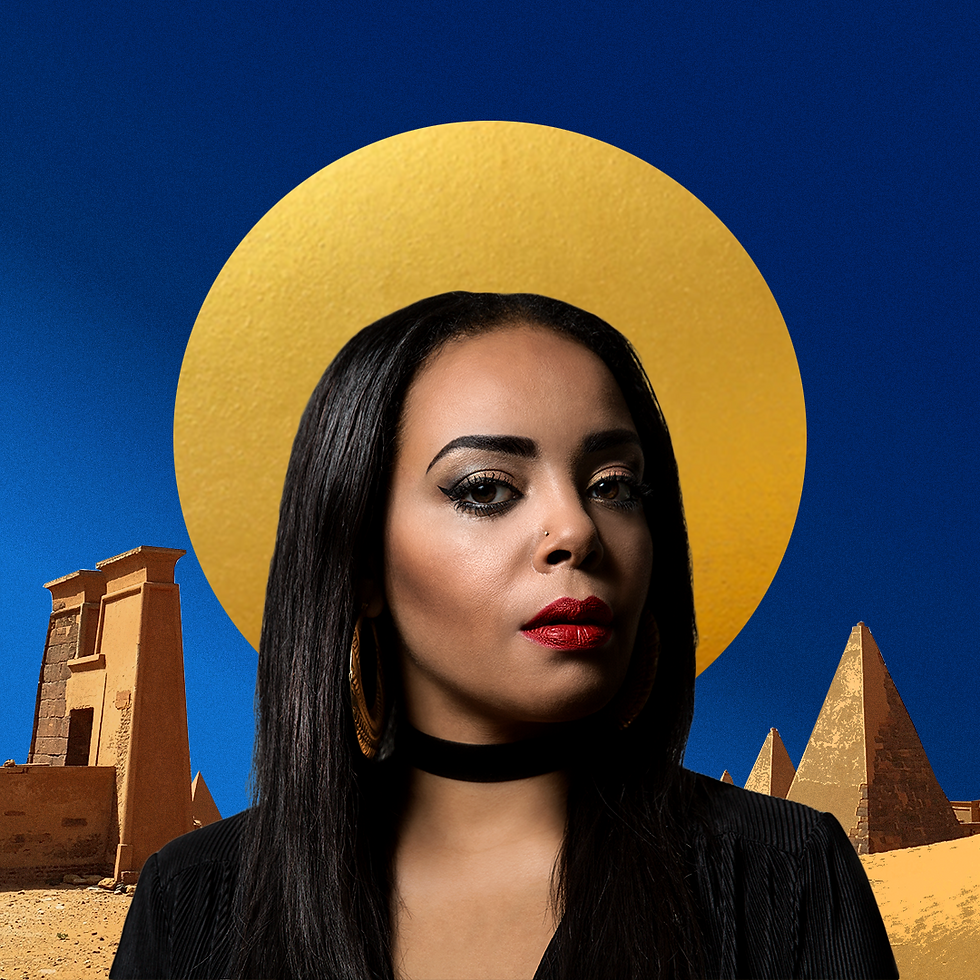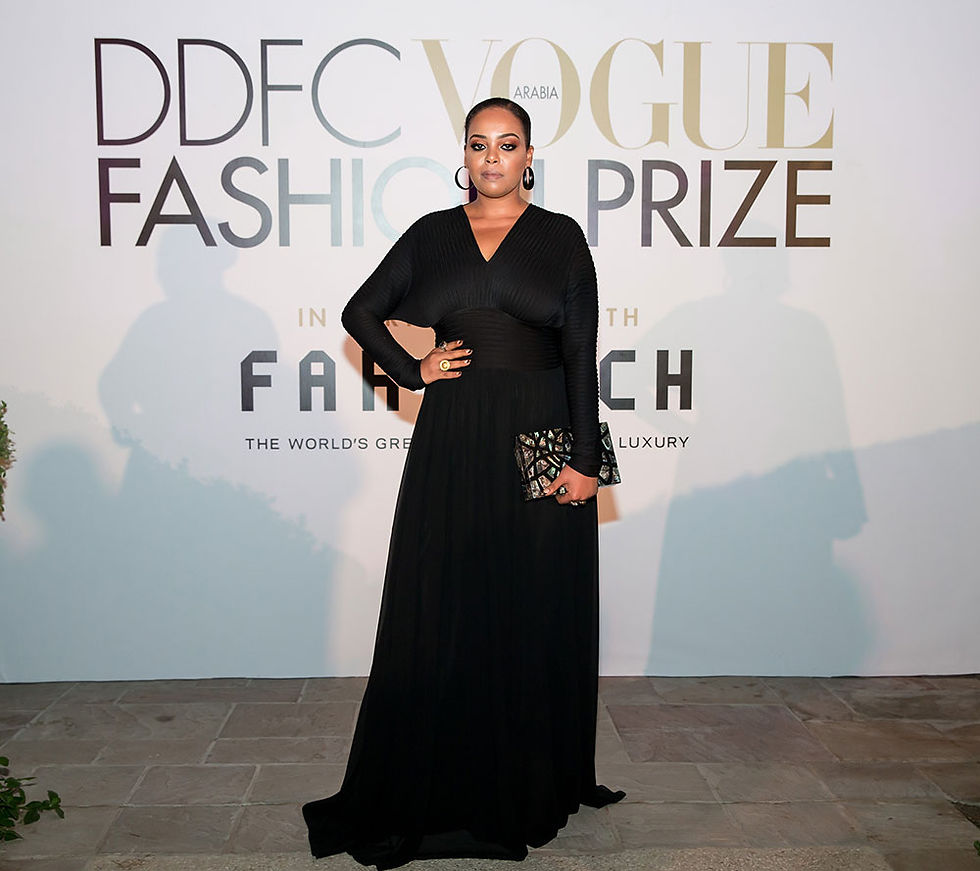From London's Grime Scene to Saudi Arabia's Renaissance, An Insight into Rozan Ahmed's Magnificent Creative Journey
- Majid Alhusseini
- Mar 24, 2024
- 7 min read
Updated: Nov 2, 2024

Rozan is a multifaceted individual whose expertise spans communications, strategic advising, cultural diplomacy, and activism. With a firm belief in the power of self-expression, she has reshaped perceptions and influenced entire markets throughout her career.
Remarkably, Razan achieved significant milestones at a young age. By 21, she was the youngest appointed editor in British publishing, and by 28, she was recognized as a Young Global Leader. Despite her impressive accolades, her focus remains steadfast on addressing global challenges through a blend of entrepreneurship, philanthropy, and innovative programming.
Razan serves as a beacon of inspiration for aspiring entrepreneurs across the UK, Africa, and Arabia, embodying resilience and leadership in her endeavors. As an ambassador and advocate for the arts, she champions social change, youth development, mental well-being, and the promotion of local creativity as a national priority.
Continuously shaping what she terms a worldwide "African renaissance," Razan's contributions leave an indelible mark on the global stage, inspiring others to strive for positive change and cultural enrichment. In this interview we speak to Razan about her beginnings, her advisory with the UN, her relationship with Dr.Sebi, her early contribution to Saudi Arabia's renaissance and much more.

What was your first ever job?
A street team member for the overall BMG Entertainment conglomerate in London - at the age of 15 LOL.
Can you explain what a ‘street team’ is for the people who don’t know?
Basically, we were a hand-picked group of very ambitious kids working in the promotions department of BMG - which at the time was home to a number of labels such as Arista and RCA. Our roster of talent was huge and brilliant. I couldn’t believe I was working with the stars I grew up idolizing, and also learning from executives who were the literal engineers of my youth's soundtrack.
Every chosen street teamer was like a baby powerhouse. We knew (very intelligently) how to generate ‘cool’. We knew all the best DJs and had them on speed dial, all the events, fashion trends, community centers, festivals, magazines, and everything else surrounding the cultivation of mass appeal. We believed in A&R. We understood guidance. We knew how to take a (good) artist, genre or record and blow it up within an avenue of critical acceptance most BMG staff had no clue about: young people.
It was the best first job a girl like me could have because it allowed for wider experimentation. I had no idea what I wanted to be in life. It was just this passionate love and curiosity for the arts, music, fashion, and the rooted cultural landscapes that make (and present) us.
I was a catalyst well ahead of my time, I knew that, and I appreciated the opportunity to explore all forms of creative strategy, expression, curation and direction. I started writing then too and soon became the youngest appointed editor in British publishing.
I felt it was time we created equilibrium between American talent and what we as Brits were making musically. That was the basis of my editorial mission at RWD magazine. Strategic storytelling, fashioning and SHAPING is where that equilibrium begins.

Being that you moved from place to place in your younger years, going from Sudan to Kuwait to Egypt and finally settling in the UK, how did that experience shape the person you are today?
There are pros and cons to a life of movement.
I’ve learned the power of flexibility, what it takes to rapidly readjust to pretty much any environment… I’ve also had to cope with devastating wars more than the average person, which helped me understand a much larger - truer - spectrum of humanity. How terrible we can be, but also how incredible we are.
You’re one of the history-makers in breaking London’s 'Grime’ scene through your work with RWD and the early use of a social media, can you take us through the most important factors that helped make Grime a household genre?
First, grime was good. At the time it didn’t even have a name. It was a super definitive GREAT sound that everyone got into quickly. It spoke to us as Londoners very loudly. That’s the only lasting factor at the end of day… being unavoidably good.
What made grime household was a smart combination of editorial relativity, artist development, taking advantage of the growing internet and just, straight up invasion. We really didn’t care. No matter the blocks we bust through them all - together.
Grime was really more of a movement in its beginning era, and that unison gave us power. The music took from everywhere to formulate its vibe… there were elements of jungle, crunk, dub, garage, reggae and hip hop. For the first time in our generation, we created, pioneered and made our name as people of color from the UK. It was and still is a monumental mark on the industry. Similarly to the explosion of Afro beats, I was there as the first and only women to write, curate and globalize our powerful story.

What is your favorite project you ever worked on and why?
Can’t pick a favorite. When you’re a catalyst you’re a natural multi-disciplinarian. All your varying works come together as one hegemonic impact. Witnessing success in the African and Arabian regions and catapulting CCI through monumental moments of exchange have been particular standouts. The Museum of the Future in Dubai, fashion, music and sports in Saudi Arabia. Creativity and diplomacy in Kenya and Nigeria. The Magic drive (@themagicdrive) is my way of giving back and I cherish our work there too. I also love the power of conversational convening, curating, connecting, speaking and driving the honest dialogue necessary for genuine development.
I’m a whole institution in one intensely layered human and recognize the audacity of my vision. I see it all come to life everyday.
Being that you’ve worked with, advised and represented several government entities and organizations such as the UN, what role do you believe art, culture, and creativity play in creating peace between nations?
Every role. I coined the acronym ‘CCI’ as a means to legitimize and better economize what we’ve been forced to understand as secondary for a reason. I argue that our power isn’t ‘soft’ for a reason. I am (amongst many things) a cultural diplomat and sought after advisor for a reason. As creative and cultural practitioners we are the keepers of emotion, the attitude rulers, the energy makers. The best thinkers and connectors when it comes to human understanding, and connection. The genuinely heartfelt storytellers that essentially paint the most important introductory picture of any given nation. I see nothing more vital in peacebuilding than matters of the heart either. All of which, we (often painfully) are responsible for. Wherever you see me musing just know that the best of that beautiful place, person or project is about to be revealed, authentically and epically.

From launching the Middle East’s international boxing stage in Riyadh, to editing the Kingdom’s first female super hero comic book series, fashion mentorship, music and tourism development and defining a new cultural expression, you have played an integral part in Saudi Arabia's renaissance over the past 10 years. From your point of view, how has Saudi changed, and where do you see it going in the future?
That’s a complicated answer but I’ll do my best to simplify… in short Saudi has actionably (and finally) realized its OWN potential.
I remember meeting friends from the Kingdom who lived in London or LA, and they always used to say they were “never going back”. They wondered why I argued and encouraged a return to build new ecosystems around a more localized ID. They hated their own home. They couldn’t see what I saw and didn’t understand what I believed in. This is something I’m used to because I’m always ahead of the game. Pioneering is generally a lonely place.
Today, a lot of them have said I was right, and show so much gratitude for planting these reorienting ideas. Many moved back and are now dedicated to Saudi’s whopping growth as an international destination. The brain gain is real, and this is definitely a massive achievement. Domesticating appreciation and taking the time to really build on what it means to be “Saudi” (just as we need to do across the African continent) is what I’d like to see more of.

You’ve cultivated a friendship with the late great Dr.Sebi, how did that relationship come about and what are the most important things you’ve learned from him?
I went to his village in Honduras and ended up living there for almost a year. We grew close immediately. He trusted me, and because he was burned by a lot of people including his own family, trust was a golden rarity for him.
I learned so much from this legendary man. He became a second father and I used to spend hours every day listening to his thoughts and memories. He used to say I reminded him of Left eye [from the legendary girl group TLC] and believed in my ability to share his legacy. Just buy my book to find out more. It’s all too profound to detail this way. (Releasing it Later this year. Announcements will be made on rozanahmed.com - inshallah :)
Through your advisory “Africanism,” you’ve dominated growth in the fashion and arts industries in Africa too. What can you tell us about this rising sector in the continent, the best projects you’ve worked on and where you see the fashion industry in Africa going?
Watch my Business of Fashion (BOF) keynote on YouTube… it’s a 20-minute breakdown answering this question perfectly.
Where do you see yourself in 10 years?
I’m really into family dynasty these days and creating a domestic empire. Coat of arms and pinkie rings... hosting the best dinners so hubby can close his deals in the most chic and nourishing energy. I’ve always been a bit of a mob wife to be honest, except I’m stupendously single.
Nothing is more fulfilling in my opinion than building a lavish family, and home. Let’s hope I’m doing exactly that over the next decade.
From the beginning of your journey until now, what are the 3 most important things you’ve learned?
1. Grace is the goal. Knowing and choosing grace is how life can be managed in the best way.
2. Mediocrity is celebrated more than anything right now, but guys… never underestimate the desperation for merit - regardless of what’s being forced as ‘popular’. Our social lens is clearing, the global south is winning, and genuine greatness is what ALWAYS lasts. Every time. Stick to being a good person. Excellent at all that you do. That’s legacy. That’s timeless. Nothing else.
3. Peace is everything. It’s key to life and essential for business. Crucial actually. We should all be advocates for peace and I say that as an order. Don’t ever think war elsewhere won’t affect you directly. It will, and it does.

Follow us on:
Make sure to share this post and subscribe to our newsletter to receive notifications on our latest posts, as well as exclusive content and much more!
Comentarios